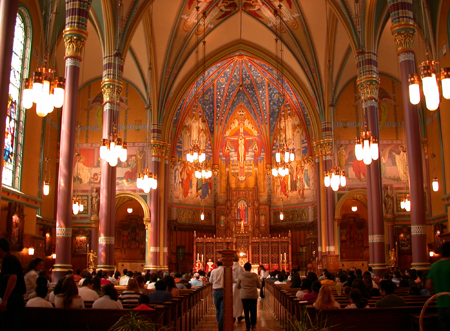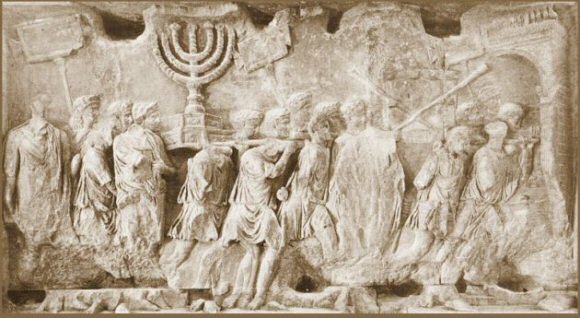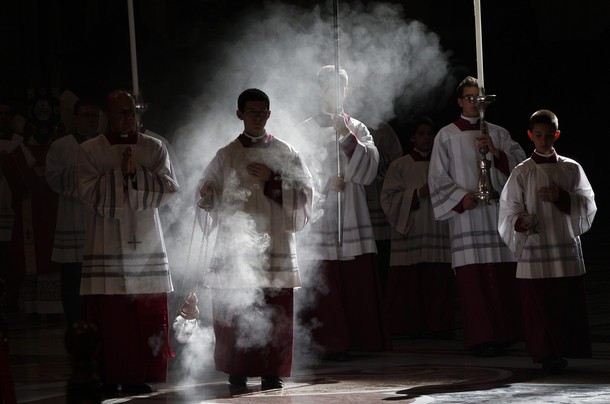Coming Soon: The Liturgical Apocalypse
The third chapter of Dr. Barber’s book he discusses the relationship between the Book of Revelation and the Catholic Liturgy. It is a brief review of the the material covered in another excellent book by Dr. Hahn’s book, The Lamb’s Supper.
Familiar Imagery & Structure
Dr. Barber begins by noting that no other apocalyptic book of antiquity relies quite so heavily on liturgical imagery as the Book of Revelation. In John’s book we find many things extremely familiar to a Catholic who attends Mass: Sunday worship, priests, vestments, incense, chalices, angels, saints etc.
In fact, the book of Revelation has profoundly impacted Christian liturgy and architecture throughout the centuries. For example, the celebrant’s chair is symbolic of the throne of God, and the surrounding chairs like those of the “elders” (Revelation 4:4).
This final book of the Bible is even divided into three parts which each have parallels with the sequence of the Catholic liturgy:
1. Penitential Rite
The early section of Revelation concerns seven letters which call the Church to repentance.
2. Liturgy of the Word
Later, a book is opened which brings about judgement.
3. Liturgy of the Eucharist
The book ends with the Church being united to Christ in the supper of the Lamb.
But why use liturgical imagery? Revelation uses liturgical imagery because the Eucharistic celebration is the way the Lord comes to His Church. Dr. Barber points out that the Greek word “parousia” which is used to refer to the Lord’s “coming” actually has the primary meaning of “presence”. Upon hearing this fact, every Catholic immediately thinks of the Eucharist and Jesus’ real presence in the Sacrament.
“Every Eucharist is Parousia, the Lord’s coming” – Cardinal Ratzinger
Sunday, Bloody Sunday
In the text of Revelation John speaks of “the Lord’s day”, saying that it was on this day that he received the vision about which he writes. This phrase has two meanings:
1. Sunday
In the Early Church, Christians referred to Sunday as “the Lord’s day” and it was the day on which the Eucharist was celebrated.
On [Sunday], when we were gathered together to break bread – Acts 20:7
Sunday was considered important because it was the day on which Jesus rose from the dead.
2. Coming Judgment
In the Old Testament, the phrase “the Lord’s day” referred to coming judgment by God upon the people:
That day is the day of the Lord God of hosts,
a day of vengeance,
to avenge himself on his foes... – Jeremiah 46:10
We looked at this in greater detail last time when we spoke about the destruction of Jerusalem.
Heaven Touches Earth
The liturgy described in Revelation is not the liturgy of earth, but that of Heaven. When we celebrate the liturgy we share in the liturgy of Heaven, worshiping with the angels and saints. We “life up our hearts” in the similar way that John was “caught up in the Spirit”.
Let us who mystically represent the Cherubim and who sing the thrice-holy hymn to the life-creating Trinity,
now set aside all earthly cares, that we may receive the King of All, who comes invisibly escorted by angelic hosts.
Alleluia, alleluia, alleluia. – The Cherubic Hymn, Liturgy of St. John Chrysostom
The article The Liturgical Apocalypse first appeared on RestlessPilgrim.net



Pingback: Coming Soon: The Liturgical Apocalypse - CATHOLIC FEAST - Every day is a Celebration